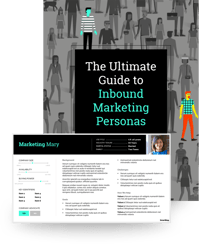
The 4 Essentials of Inbound Marketing for Healthcare Companies
April 20, 2015
By Tony Adragna
The healthcare industry continues to be in constant flux, as changes are made frequently. As the healthcare industry continues to change, so should your marketing for your healthcare practice. Now more than ever, patients are able to obtain medical information through a quick Google search, as well as search for nearby healthcare practices. Marketing is essential to your healthcare practice's success, and this post will highlight four essentials of healthcare marketing.
1. A Compelling Website That Appeals to Your Buyer
You probably know by now that your healthcare company, be it tech or a practice, should absolutely have a web presence. Your website is the gate to everything your potential buyer needs to learn about you, your product or service, and why it is beneficial to them. Stop thinking of your website as a brochure and start utilizing it as a sales tool. In order to create a compelling you website you will need:
- Clearly identified buyer personas: Are you targeting a technical person, the end-user, or a person more focused on the ROI of your offering (like a C-level executive). Why are you targeting these people and more importantly, who are they? You can read more about personas here.
- The right language and terminology: Once you know your personas, you will need to ensure the right language and terminology is used across your website. This not only affects search engine optimization (which we'll discuss below), but also ensures that you're able to relate to your personas. By using the language youer personas use, your website communicates that you know what's going on in the industry and thus improves trust.
- An obvious conversion path: The goal of a website, for any company, is to lead the user to the pages that are most important. As inbound marketers, we know that getting a person to convert from a visitor to a contact or lead is the most improtant pathway. In order to do this you need calls-to-action (CTAs), landing pages with forms, and extremely useful content. You will also need pages that make sense for your site. For example, if you are a healthcare clinic, your website should include your location so that visitors know if it's feasible to get to your office. If you're in healthcare tech your website should include a product or pricing page with CTAs that correspond to the personas.
- Proper imagery: Similar to language and terminology, the way your website looks affects how visitors perceive your authority and trust on subject. (You can read about website redesign best practices here). Your imagery should match the personality and tone of your personas job and what they expect out of the industry.
Once your compelling website is built, you can move on to building out the rest of your marketing plan.
2. Search Engine Optimization (SEO)
As mentioned above, SEO is important to a compelling website, but is also essential to your healthcare marketing plan as a whole. Having a website that isn't optimized means that you are missing out on website visitors and potential buyers whether that be hospital executives or patients. So, where do you start?
SEO should be a part of your monthly marketing process. It isn't something you should just do once and then be done with it. You should constantly be analyzing keywords that your healthcare tech company or practice can rank for. Have a new campaign? Do keyword research. Need to launch a new page on your website? Do keyword research. Promoting an ebook? Make sure a keyword is in the title and do your research. There are several free tools, like Google, that you can use to research keywords that your personas are typing into search enginge. For more robust tools, HubSpot is a good option. If you have questions about the HubSpot tools, you can ask us here.
In your keyword research, you should try to find keywords that have a high volume of searches, but are not extremely difficult to rank for. For example, ranking for 'Indianapolis doctor' may be hard to rank for, but 'Indianapolis physical therapist' may be easier. And as always, make sure it appeals to your personas and that your keywords aren't entirely product focused. If you are a healthcare company selling an app to improve patient ROI to hospitals by deducting time from office visits, you may try and rank for "healthcare ROI app", but your personas aren't likely looking for that. Instead try to rank for their problems, such as "improve patient ROI for hospitals". Then, create content about that.
3. Targeted, Appealing, and Newsworthy Content
Educational content and content that is helpful to your personas can be a driving force to gaining more website visitors. As we mentioned above, after you do your keyword research, your keywords should be used in the content you produce on your website. The types of content you should create and produce are:
- CTAs, Landing Pages, and Thank You Pages: These pieces of content are the core of the conversion path. You must have these in order to get leads from your website. The CTA leads to a landing page with a form on it, the potential leads fills out a form (for whatever piece of content you're offering) and is directed to a thank you page where they can retrieve the PDF of what you're offering.
- Blog posts - You should be blogging at least twice a week using relevant keywords in your blog titles. Your blog should be educational and helpful to your potential patients. Blog posts are what will bring in visitors over the long term.
- Ebooks/White Papers - In the first bullet point we talked about offering a piece of content retrieved from filling out a form on a landing page. Ebooks and white papers are primarily the content your will be offering. You should create a keyword-centric landing page for your ebooks/white papers that offers the content in exchange for your website visitor's contact inforation. The content should be informative, industry-related and should answer questions about how to solve a problem and not necessarily your product alone.
- Webinars - Maybe your healthcare practice is doing something innovative, or you want to hold a Q&A. Webinars are great for that. They are also a great indiciator of more qualified leads.
- ROI Focused Case Studies - Why should someone buy from you? When you create customer case studies that prove the ROI of your work, this will help qualified leads feel more confidence in purchasing fromt you.
There are other pieces of content you can offer on your website, but the ones listed above are the most popular. By producing the right content, you can capture potential patients' information, then nurture them through the sales funnel, where ultimately the become a client or patient.
4. Promotional Social Media Campaigns
Social media continues to gain more and more traction through all age groups. You should do some research to see which social media channels your current and potential customers are using, then become active on those social channels. Some ways social media can be beneficial for your practice are:
- You can empower your current patients to promote your social channels
- You can share the content that you produce
- You can communicate with current and potential patients
Social media isn't going away anytime in the near future, so the sooner you can create an active presence there, the better.
Healthcare marketing can be tough in a sometimes-saturated market, but you can set your practice apart from the others by using these four essentials of healthcare marketing.
What marketing tactics have you used in the past that didn't work?

About the author
Tony Adragna was formerly an Associate Consultant for SmartBug Media. Using his project management and digital marketing background, Tony helps implement their inbound marketing strategies. Read more articles by Tony Adragna.




















